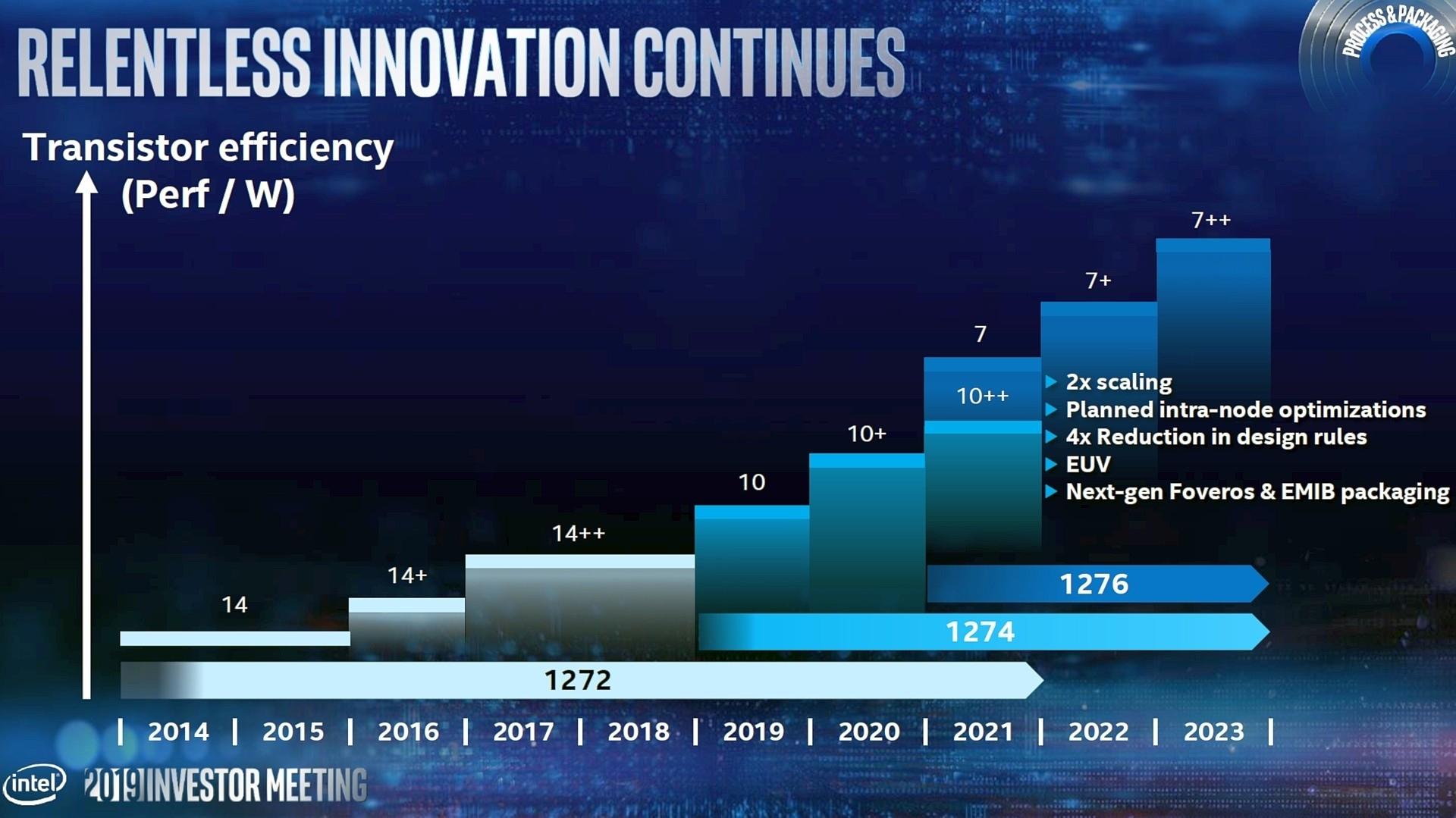Take it with a grain of salt of course..Intel seems to have dropped all plans for a 10nm desktop processor launch and are now aiming to release 7nm desktop processors in 2022. The information comes from Hardwareluxx who have got a tip from their trustworthy insiders that Intel's 10nm line of processors would miss out on a desktop launch entirely and users who are waiting for sub-14nm processors from Intel would have to wait till 2022.
The report says that Intel's 10nm supply just isn't enough to handle mass markets such as desktop at the moment which is why they will be offering 14nm replacements up till 2022. There are two 'S' desktop families which we already know about that include Comet Lake-S (2020) and Rocket Lake-S (2021). Both lineups would be built on enhanced 14nm nodes and would offer a decent single-core and multi-core performance given the added number of cores and threads which many consumers are expecting.
This simply means that an Intel 10nm desktop launch is out of the question but where does Intel go with 7nm? Well, rumor has it that Intel's replacement to Rocket Lake-S would be Meteor Lake-S. The new processor lineup would be the first desktop outing since 2015's Broadwell to be based on a new process node and not a variation of 14nm (+++). The rumor mill has also hinted that while the Rocket Lake-S lineup would be based on 14nm, it is likely that Intel would port their newer core architecture down to 14nm to add some much-needed performance increments.
More information here
-
Ever wanted an RSS feed of all your favorite gaming news sites? Go check out our new Gaming Headlines feed! Read more about it here.
-
We have made minor adjustments to how the search bar works on ResetEra. You can read about the changes here.
Rumor: Intel To Skip 10nm For Desktop CPUs, Will Offer 7nm Desktop CPUs in 2022
- Thread starter Kolx
- Start date
You are using an out of date browser. It may not display this or other websites correctly.
You should upgrade or use an alternative browser.
You should upgrade or use an alternative browser.
I'll take that bet!I hope that's not true, they can't keep on 14nm for 3 more years.
This isn't the first time this rumour has been heard. Starting to sound worryingly likely.
Intel's 10nm and AMD's 7nm are pretty much the same thing.Are there issues with achieving 10 nm that wouldn't be applicable to 7 nm?
If they're struggling with 10nm, why wouldn't they struggle with 7nm?
7's half of 14 so they'll just cut their CPUs in half. 14 down to 10, you've got to measure it out with a tiny ruler so you don't cut off too much or too little. I don't know anything about computers.
So I guess I am sticking with my 9700k till 2022.
Either that or I am going to have To switch out my MOBO and go Amd.
Either that or I am going to have To switch out my MOBO and go Amd.
They are already fucking up with low single core performance and low clocks...
who's ready for 14++++++++++++? this is AMD's time to shine. don't fuck this up
That's why Intel don't need a 7nm CPU now.
I don't think this will change soon.
Are there issues with achieving 10 nm that wouldn't be applicable to 7 nm?
They are already fucking up with low single core performance and low clocks...
That's why Intel don't need a 7nm CPU now.
I don't think this will change soon.
Low single core performance?
I can't wait for Windows and MacOS to make the full switch to ARM. It will be glorious. Hard at first, but it is needed.
Compared to Intel? yes... most because they can't sustain high clocks...
wtf you talking about, zen 2(ryzen 3000) is clock for clock on par or slightly below intel
lol expecting every cpu to run at 5ghz is quite frankly unrealistic
Compared to Intel? yes... most because they can't sustain high clocks...
IPC is on par, so it's only clock speed that still gains, and the difference is not that high, would not call that "low". Multi core performance AMD smashes Intel on all price ranges, from low end to Epic cpus.
The end of the computer industry as we know it.
CPUs so dense, the universe folds in on them.
I have a Ryzen 7 3700X It can't sustain even 4.3 on all cores with decent voltage.IPC is on par, so it's only clock speed that still gains, and the difference is not that high, would not call that "low". Multi core performance AMD smashes Intel on all price ranges, from low end to Epic cpus.
Best i ever see one core with PBO and Auto OC was 4393 MHZ.
insert fortnite black h--
heh, beaten
You will be able to play Skyrim on your CPU.
Different processes with different way of manufacturing. Intel's 7 nm will use EUV.If they're struggling with 10nm, why wouldn't they struggle with 7nm?
Because with 7nm Intel will be using EUV lithographie, making it far easier to draw fine details and to simplify process steps.If they're struggling with 10nm, why wouldn't they struggle with 7nm?
Intel spoke about 4 times less design rules for 7nm vs. 10nm.

In general Intel will intercept a lot of the learnings from 10nm and their design choices and will make adjustments for the 7nm specification.
We may never even get that low with our current manufacturing methods. 3 nm is the practical limit.
well you can already play crysis on one granted not very well but hey it runs
Hard to say right now, how viable die shrinks will be. At some point they will hit a wall and they have to be creative.
True, but having issues right no
Compared to Intel? yes... most because they can't sustain high clocks...
I thoughed, having issues with sustaining high clocks is an issue with a small node like TSMC
s 7nm in general. Wouldn't Intel run in similar issues with their 10/7nm fab?
Are all replies jokes or serious can't tell? will gpus and cpus just stop improving at 1nm then? So we're like 10 years away from hitting a wall?
Even on ULV laptop parts they still have 14nm products along side 10nm, as if it wasn't confusing enough. IceLake quantity seems to be very limited and it's only shipping on uber expensive ultrabooks like Dell XPS 2-in-1 (XPS13 refresh has 14nm! part, if you don't do your homework you easily miss it), surface line or probably the upcoming macbooks. Everything else is a rebrand practically. Even then Icelake part are not faster, they have a lot slower clock speeds yet battery life doesn't seem to have improved much. The main selling point is their iGPU which is pretty decent.
I am expecting for 11th gen, they will be like hey hyper threading is now back on i7 because they got nothing else. 10th desktop part seem completely useless, it's just practically a rebrand, it's not a new product.
I am expecting for 11th gen, they will be like hey hyper threading is now back on i7 because they got nothing else. 10th desktop part seem completely useless, it's just practically a rebrand, it's not a new product.
If they're struggling with 10nm, why wouldn't they struggle with 7nm?
Intel would be taking the lessons they learned from 10nm on top of using EUV. They will also be less aggressive with the overall performance and area efficiency requirements, so the process will be more manageable to get up and running.
It seems like the big issues with 10nm consisted of using way too many new and complex process technologies on top of trying to reach extremely aggressive performance and area targets. Iif I recall correctly, Intel had similar issues with 14nm at the beginning of its life (of course not as bad). They, however, had the benefit of having no worthwhile competition from AMD then.
Cant go lower than 5nm.
Really? So we already at the end then basically
7nm node already happened, it's a 2014 article.
That's an old article.
First of all, 7nm is readily available (my phone with a Snapdragon 855 is 7nm), and Samsung will start commercializing 5nm as soon as next year.
Wouldn't you be switching mobos everytime you swap Intel CPUs anyways?So I guess I am sticking with my 9700k till 2022.
Either that or I am going to have To switch out my MOBO and go Amd.
Wouldn't you be switching mobos everytime you swap Intel CPUs anyways?
yes, maybe now that they are pressured they change but right now if you are building a desktop AMD platform just makes far more sense. AM4 has another generation to go and the one after that could have really long legs.
Wouldn't you be switching mobos everytime you swap Intel CPUs anyways?
Lol Yah..That is true.
With our current manufacturing methods we will hit a wall. There is a limit to how close you can pack silicon atoms together before physics start working against you(look up quantum tunneling).Are all replies jokes or serious can't tell? will gpus and cpus just stop improving at 1nm then? So we're like 10 years away from hitting a wall?

